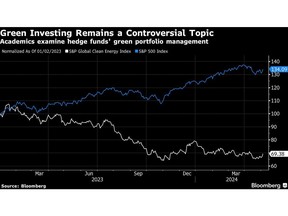If you want to know how your green stock portfolio is likely to perform in the next quarter, you should take a look at hedge fund options bets.

Article content
(Bloomberg) — If you want to know how your green stock portfolio is likely to perform next quarter, you should take a look at hedge funds’ options bets.
That’s according to a newly published academic paper that examines a decade’s worth of data from more than 1,900 hedge fund firms through 2022.
Article content
A key finding of the study is that hedge fund managers’ construction of put and call options on a particular green stock can be used to “predict the stock’s future returns,” according to George Aragon, a professor at Arizona State University and co-author of the paper, said in an interview.
Advertising 2
Article content
The analysis feeds into a broader debate about green investment strategies, which have produced mixed results in recent years. The S&P Global Clean Energy Index fell more than 20% last year as the impact of higher interest rates hurt capital-intensive green projects. This year it has fallen another 12%. In comparison, the S&P 500 has gained around 30% since the beginning of 2023.
Prominent Republicans have used such data to attack green investing as a violation of a portfolio manager’s fiduciary duties, leading to legal threats and outright bans on the broader environmental, social and governance investing movement.
Against this backdrop, the hedge fund industry’s approach to green investing is of particular interest. The authors of the paper titled Are Hedge Funds Exploiting Climate Concerns? assume that hedge funds have no “non-financial preferences,” meaning their green bets are made with only a fiduciary goal in mind.
The study found that hedge funds are generally better than the broader market at predicting changes in sentiment and prices surrounding green stocks and profiting from those changes. For example, when general interest in climate change wanes – as measured by the number of climate news stories – hedge funds use put options to sell at pre-agreed prices while green stocks lose value.
Article content
Advertising 3
Article content
Conversely, when there is greater general interest in climate change, hedge funds use call options to buy at pre-agreed prices in a rising market.
Aragon, who did not single out individual hedge funds, said the results suggest that investment managers using the strategy are consistently “better at identifying green sentiment and predicting how it will affect prices around green stocks.” , and then use sophisticated tools like options to make bets.”
For other investors who want to use this information to support their own strategies, the key is the concentration of options, Aragon said.
Increasing the proportion of hedge funds holding put options on green stocks from zero to 10% would mean a nearly 17% drop in the stock price in the following quarter, he said. Price action is benchmark-adjusted, meaning it measures excessive decline compared to other stocks with similar characteristics.
Conversely, an increase in the proportion of hedge funds holding call options on green stocks from zero to 10% would predict a benchmark-adjusted increase in the share price of nearly 6% in the following quarter.
Advertising 4
Article content
The team of scientists behind the study, including Yuxiang Jiang of the Southwestern University of Finance and Economics, Juha Joenvaara of Aalto University and Cristian Tiu of the University at Buffalo, measured climate concern based on news flows from major US news media outlets.
The researchers also examined several other theories to assess how hedge funds approach green investment strategies.
One involved an analysis of how well hedge funds with long-only holdings of green stocks perform to see if they are simply better at picking the right stocks. By creating “copycat portfolios” of stocks held by hedge funds (based on the funds’ regulatory so-called 13F filings), researchers were able to compare their performance with equivalent portfolios containing the holdings of brown hedge funds (defined as funds, the (in the past, when green stocks performed well), they also compared their results to a market portfolio of green stocks.
The researchers found that the outperformance of the green copycat portfolio over the market portfolio was “marginally significant” at 1%, Aragon said.
However, compared to the brown portfolio, the outperformance was over 5%, he said.
Additionally, hedge funds identified by the researchers as green — based on an analysis of their returns rather than customer-focused labels or marketing — outperformed brown hedge funds by 7% on an annual basis, Aragon said.
“The evidence suggests that certain hedge funds are generating alpha from investors’ climate concerns,” he said.
– With support from Justina Lee.
Article content
